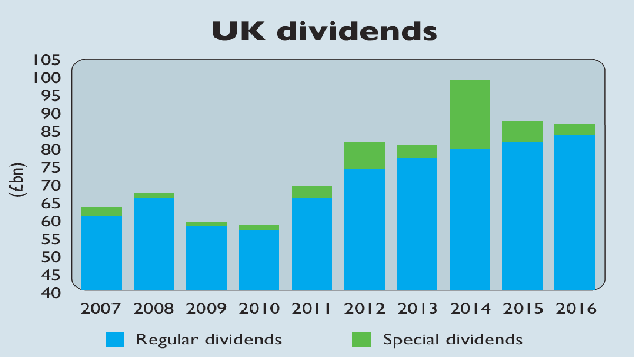UK share dividends dry up
Investors in UK-listed shares have been affected by a number of high-profile companies cancelling their dividends.

Get the latest financial news, insights and expert analysis from our award-winning MoneyWeek team, to help you understand what really matters when it comes to your finances.
You are now subscribed
Your newsletter sign-up was successful
Want to add more newsletters?

Twice daily
MoneyWeek
Get the latest financial news, insights and expert analysis from our award-winning MoneyWeek team, to help you understand what really matters when it comes to your finances.

Four times a week
Look After My Bills
Sign up to our free money-saving newsletter, filled with the latest news and expert advice to help you find the best tips and deals for managing your bills. Start saving today!

Stockmarket investors make most of their money in the long run by reinvesting dividends. A hundred pounds invested in UK stocks in 1899 would have turned into an inflation-adjusted £28,261 by the end of 2014, assuming all income had been reinvested. Without reinvestment, the £100 would only have grown to £184, says Barclays' latest annual Equity Gilt Study.So it's worth keeping an eye on the outlook for dividends. Unfortunately, that's not especially encouraging right now.
Investors depend "on the fortunes of just a few industries" for their income, says Buttonwood in The Economist. In Britain, France, Germany and Switzerland, more than 70% of all dividends come from just 20 companies. Banks were reliable income sources until the crash. Then miners and oil and gas firms became key. But now the commodities boom has turned to bust, threatening payouts.
This is a particular problem for the commodities-heavy UK stockmarket and is the main reason that dividends across the FTSE 350 are expected to fall this year. Last year, dividends (excluding special payouts) rose by 6.8% to a record £84.6bn, says Capita Asset Services (see chart). This year the figure looks set to fall for the first time since 2010, dropping nearly 1% to £83.8bn. Since October, around £3.4bn of cuts have been announced. Anglo American has cancelled its £900m payout. BHP Billion, which paid out almost £2bn in 2016, looks vulnerable.
MoneyWeek
Subscribe to MoneyWeek today and get your first six magazine issues absolutely FREE

Sign up to Money Morning
Don't miss the latest investment and personal finances news, market analysis, plus money-saving tips with our free twice-daily newsletter
Don't miss the latest investment and personal finances news, market analysis, plus money-saving tips with our free twice-daily newsletter
Meanwhile, Standard Chartered has axed a £1bn dividend,and the market will lose SABMiller's £1.3bn payout now that it is being taken over. Supermarkets continue to struggle amid a vicious price war. Food and drug retailers paid out 57% less in 2015 than the year before. Meanwhile, the broader economic backdrop seems to have deteriorated. Accountancy firm EY reports that profit warnings from UK-listed companies rose to 313 last year, up from 299 in 2014 and the highest since 449 were issued in 2008.
Because 40% of British dividends are declared in dollars, the pound-dollar exchange rate has a major impact on income. Here at least, there is good news. Last year, the strong dollar added £2.5bn to the annual total, estimates Capita, and currency gains accounted for two-thirds of the growth in FTSE 100 dividends. If the pound maintains its current rate against the dollar, investors can expect a further £1bn income boost in 2016.
Get the latest financial news, insights and expert analysis from our award-winning MoneyWeek team, to help you understand what really matters when it comes to your finances.

-
 How a ‘great view’ from your home can boost its value by 35%
How a ‘great view’ from your home can boost its value by 35%A house that comes with a picturesque backdrop could add tens of thousands of pounds to its asking price – but how does each region compare?
-
 What is a care fees annuity and how much does it cost?
What is a care fees annuity and how much does it cost?How we will be cared for in our later years – and how much we are willing to pay for it – are conversations best had as early as possible. One option to cover the cost is a care fees annuity. We look at the pros and cons.